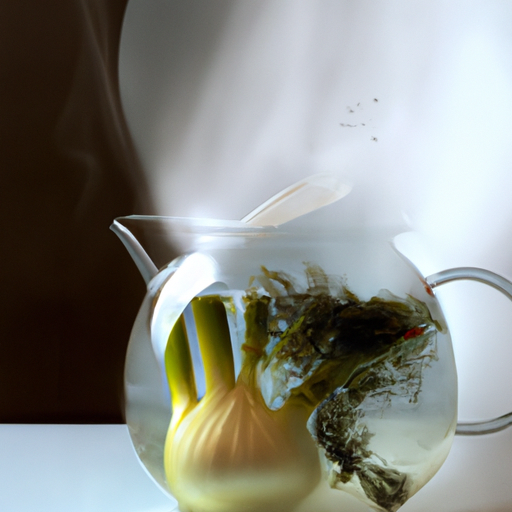As an expectant mother, I am always looking for information on what is safe to consume during this important time. One drink that has caught my attention is turmeric tea, which is renowned for its anti-inflammatory and antioxidant qualities. However, is it safe to drink while pregnant?
In this article, we will explore the nutritional benefits of turmeric, discuss the safety concerns surrounding its consumption during pregnancy, and provide alternative remedies for pregnant women looking to incorporate turmeric into their diets.
Turmeric tea has been used for centuries in traditional medicine and cooking, particularly in India and other parts of Southeast Asia. It is made by steeping ground turmeric root in hot water, sometimes with the addition of other spices such as ginger and cinnamon. Turmeric is known for its bright yellow color and distinct flavor, which has been described as earthy and slightly bitter.
While turmeric is widely considered to be safe and beneficial for most people, there are certain precautions that pregnant women should take when consuming this spice. Let’s delve deeper into the nutritional benefits of turmeric and how it can impact pregnancy.
Key Takeaways
- Turmeric tea has many health benefits due to its natural anti-inflammatory and antioxidant properties.
- Pregnant women should consume a balanced diet and avoid certain foods, including raw or undercooked meats, fish with high levels of mercury, and unpasteurized dairy products.
- Herbal supplements, including turmeric, should be consumed with caution during pregnancy and pregnant women should speak with their healthcare provider before consuming them.
- Alternative remedies such as ginger, chamomile tea, and lavender oil may be safer for pregnant women.
Overview of Turmeric Tea
You’re probably wondering what turmeric tea is and how it can benefit you during pregnancy. Turmeric tea is an herbal tea made from boiling water and turmeric powder or grated turmeric root. It’s a popular beverage known for its numerous health benefits. Turmeric is a natural anti-inflammatory and antioxidant, and it also has medicinal properties.
Turmeric tea recipes are easy to find online and can be easily prepared at home. During pregnancy, turmeric tea can be beneficial for your skin. It can help reduce inflammation, which can help reduce acne breakouts that are common during pregnancy. However, excessive consumption of turmeric during pregnancy may have adverse effects.
In the next section, we’ll discuss the nutritional benefits of turmeric and how it can be incorporated into your diet during pregnancy.
Nutritional Benefits of Turmeric
Did you know that adding a pinch of turmeric to your meals can increase your daily intake of iron by up to 16%? This golden spice is not just a flavorful addition to your food, but it also has numerous nutritional benefits that can improve your overall health. Turmeric is rich in antioxidants, which can protect your body from harmful free radicals and reduce inflammation. Additionally, turmeric is a good source of manganese, potassium, and vitamin C, all of which are essential for maintaining optimal health.
To give you an idea of just how nutrient-dense turmeric is, here is a table comparing the nutritional content of one teaspoon of turmeric powder to the same amount of some common foods:
| Nutrient | Turmeric Powder | Spinach | Carrots | Chicken Breast |
|---|---|---|---|---|
| Iron | 1.8 mg | 0.8 mg | 0.3 mg | 0.6 mg |
| Manganese | 0.1 mg | 0.1 mg | 0.1 mg | 0.0 mg |
| Potassium | 49.5 mg | 23.7 mg | 36.6 mg | 167.6 mg |
| Vitamin C | 0.1 mg | 0.5 mg | 0.6 mg | 0.0 mg |
Incorporating turmeric into your diet can be as simple as adding it to your morning smoothie or making a turmeric tea. You can also find turmeric supplements in the form of capsules or tablets. In the next section, we will explore whether consuming turmeric tea or supplements is safe during pregnancy.
Pregnancy and Diet
Maintaining a healthy diet during pregnancy is essential for the well-being of both the mother and the developing baby. As a pregnant woman, it’s important to consume a balanced diet that includes a variety of fruits, vegetables, whole grains, lean protein, and healthy fats.
Additionally, there are specific guidelines to follow to ensure a healthy pregnancy. Here are three important things to keep in mind:
-
Importance of exercise: Regular physical activity can help improve overall health and reduce the risk of complications during pregnancy. It’s recommended to engage in at least 30 minutes of moderate exercise every day, as long as your healthcare provider approves. Examples of safe exercises for pregnant women include walking, swimming, and prenatal yoga.
-
Avoiding certain foods: Certain foods can be harmful to the developing baby and should be avoided during pregnancy. This includes raw or undercooked meats, fish with high levels of mercury, unpasteurized dairy products, and foods high in caffeine. It’s important to consult with your healthcare provider to ensure that you’re following a safe and healthy diet.
As a pregnant woman, it’s important to take necessary steps to ensure a healthy pregnancy. While diet and exercise are important, there are also safety concerns to keep in mind regarding certain activities and substances.
Safety Concerns
It’s crucial to be aware of safety concerns during pregnancy, as studies show that every year in the US, approximately 700 women die from pregnancy-related complications. One area of concern is the use of herbal supplements, including turmeric. While turmeric is generally safe for consumption in small amounts, there are potential complications to be aware of when consuming it during pregnancy.
Possible complications include uterine contractions and the potential to stimulate menstrual flow, which could lead to a miscarriage in early pregnancy. Additionally, turmeric is a natural blood thinner and could increase the risk of bleeding during delivery. It’s important to speak with a healthcare provider before consuming any herbal supplements during pregnancy, including turmeric. By being informed and cautious, pregnant women can take steps to ensure a safe and healthy pregnancy.
Moving forward to the next section about research studies, it’s important to note that there have been studies conducted on the safety of turmeric during pregnancy.
Research Studies
Research studies have shown that pregnant women should be cautious when consuming herbal supplements, as there are potential complications that could harm both the mother and the baby. In the case of turmeric tea, there is limited research on its effects during pregnancy. However, some studies suggest that turmeric may interfere with fetal development, particularly in the first trimester.
To better understand the potential risks of consuming turmeric tea during pregnancy, it is important to consider the following points:
-
Turmeric contains curcumin, a compound that has been shown to have anti-inflammatory and antioxidant properties. However, curcumin may also act as a blood thinner, which could increase the risk of bleeding during pregnancy.
-
Some animal studies have suggested that high doses of curcumin may cause developmental abnormalities in the fetus.
-
Turmeric may also interact with certain medications commonly prescribed during pregnancy, such as blood thinners and diabetes medications.
-
While turmeric is generally considered safe to consume in small amounts as a spice in food, it is unclear whether the concentrated amounts in turmeric tea could pose a greater risk during pregnancy.
Considering these potential risks, it’s best for pregnant women to speak with their healthcare provider before consuming turmeric tea or any other herbal supplements. In the next section, we’ll explore alternative remedies that may be safer for pregnant women.
Alternative Remedies
Looking for alternative remedies during your pregnancy? Herbal supplements and natural remedies are a popular choice for many women. However, it’s important to be cautious when taking any form of medication, even if it’s considered ‘natural’. Some herbs and supplements may have adverse effects on your pregnancy, so it’s crucial to do your research and consult with your healthcare provider before trying any new remedy.
Some common natural remedies that may be helpful during pregnancy include ginger for morning sickness, chamomile tea for relaxation, and lavender oil for stress relief. However, always check with your healthcare provider before using any herbal supplement or natural remedy to ensure they are safe for you and your baby.
Remember, what works for one person may not work for another, so it’s essential to find what works best for you and your pregnancy. Transitioning into the next section, it’s important to consult with your healthcare provider before trying any new remedy to ensure it’s safe for you and your baby.
Consultation with Healthcare Provider
Before you try any new remedy during pregnancy, it’s important to consult with your healthcare provider first. This is because some supplements may not be safe for you and your growing baby.
Your healthcare provider can provide you with the necessary information on whether it’s safe to consume turmeric tea during pregnancy or not. It’s also important to discuss your exercise routine with your healthcare provider.
Exercise during pregnancy has numerous benefits, but it’s important to ensure that you’re engaging in safe and appropriate activities. Your healthcare provider can recommend exercises that are safe for you and your baby.
Now, let’s discuss some precautions for pregnant women.
Precautions for Pregnant Women
It’s important for expecting mothers to take precautions to ensure a healthy pregnancy and safe delivery. This includes being mindful of what they consume, including herbal remedies like turmeric tea. While turmeric is generally considered safe, there are some precautions pregnant women should take.
One such precaution is to ensure that the turmeric used in tea is not contaminated with lead or other toxins. Additionally, pregnant women should not consume excessive amounts of turmeric, as it may stimulate the uterus and potentially cause contractions. Along with being cautious about what they consume, pregnant women should also consider wearing appropriate maternity clothing and engaging in prenatal exercises to support their overall health and well-being.
Moving forward, let’s discuss some tips for making turmeric tea that are safe for pregnant women.
Tips for Making Turmeric Tea
To brew a safe and soothing cup of golden goodness for you and your little bun in the oven, spice up your life with some ginger and a pinch of cinnamon. These two ingredients balance the flavor of turmeric tea and add a touch of warmth to your drink. If you prefer a sweeter taste, you can also add honey or stevia, but make sure to use in moderation.
When it comes to brewing techniques, there are several options to choose from. The most common method is to simmer turmeric powder or grated root in water for 10-15 minutes, strain, and enjoy. You can also make a turmeric paste by mixing the powder with water or oil, and add it to hot water or milk.
Another option is to use a tea bag or blend of turmeric and other herbs, such as chamomile or peppermint, for a more complex flavor. Experiment with different combinations and find the one that suits your taste buds and pregnancy needs.
Frequently Asked Questions
How much turmeric tea is safe to consume during pregnancy?
During a healthy pregnancy, it is generally safe to consume herbal teas in moderation. Turmeric tea can provide anti-inflammatory benefits, but it is recommended to limit intake to no more than 1-2 cups per day.
Can turmeric tea interact with any prescription medications during pregnancy?
It’s important to be cautious when taking prescription medications during pregnancy. Turmeric tea may interact with certain medications, so it’s best to consult with a healthcare provider. Alternative remedies may also be considered to avoid potential risks.
Is turmeric tea safe to consume during all trimesters of pregnancy?
Turmeric tea benefits pregnant women if consumed in moderation. However, it is advisable to consult a doctor before including it in your diet. Turmeric tea alternatives include ginger tea, which is known to alleviate nausea and vomiting during pregnancy.
Can turmeric tea be harmful to the developing fetus?
As a pregnant woman, I avoid turmeric tea as it may harm the developing fetus due to its blood-thinning properties. However, turmeric tea benefits non-pregnant individuals and there are safe alternatives such as ginger tea.
Are there any side effects of consuming turmeric tea during pregnancy?
As a pregnant woman, I should consume turmeric tea in moderation and follow the recommended intake. While there are potential benefits, overconsumption may lead to side effects such as heartburn, indigestion, and uterine contractions.
Conclusion
Overall, turmeric tea can have many benefits for pregnant women, including anti-inflammatory and antioxidant properties, as well as potential relief for morning sickness and other pregnancy-related symptoms. However, it’s important to consult with a healthcare provider before consuming turmeric tea, as there are potential safety concerns and it may interact with certain medications.
In the end, it’s always better to err on the side of caution and prioritize the health and safety of both the mother and the baby. As the saying goes, "better safe than sorry."
So, if you’re pregnant and considering incorporating turmeric tea into your diet, be sure to speak with your healthcare provider first to determine if it’s safe for you and your baby.










